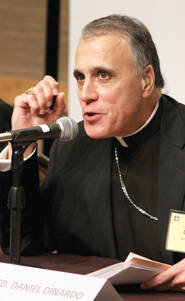Taking on the issue of physician-assisted suicide in the state where voters most recently approved it, the U.S. bishops declared suicide “a terrible tragedy, one that a compassionate society should work to prevent.” Approved 191 to 1 on June 16 at the bishops’ spring general assembly near Seattle, the policy statement, To Live Each Day With Dignity, is the first document by the bishops as a body on the topic of assisted suicide.
Introducing the statement, Cardinal Daniel N. DiNardo of Galveston-Houston, chairman of the U.S. Conference of Catholic Bishops’ Committee on Pro-Life Activities, said he hoped it would counter the recent “strong resurgence” in activity by the assisted suicide movement. “With expanded funding from wealthy donors, assisted suicide proponents have renewed their aggressive nationwide campaign through legislation, litigation and public advertising, targeting states they see as most susceptible to their message,” the document says. “If they succeed, society will undergo a radical change.”
Physician-assisted suicide was approved by voters in Washington state in November 2008. It is also legal in Oregon, where voters approved it in 1994, and Montana, where a state court has ruled it is not against public policy.
As Cardinal DiNardo was making his preliminary presentation of the document, representatives of Compassion & Choices, previously the Hemlock Society, held a news conference in the same hotel where the bishops were meeting. Barbara Coombs Lee, president of the organization, said the bishops’ document represented an attempt to impose Catholic beliefs on the entire U.S. population.
“While we respect religious instruction to those of the Catholic faith, we find it unacceptable to impose the teachings of one religion on everyone in a pluralistic society,” she said. “We believe end-of-life care should follow the patient’s values and beliefs, and good medical practice, but not be restricted against the patient’s will by Catholic Church doctrine.”
Responding to that charge at a later news conference, Cardinal DiNardo said the bishops were making a contribution to a “fundamental public debate” based on “our moral tradition and sense of solidarity with people.”
“The compassionate way is to bring assistance to people,” not to encourage their deaths, he said. According to the new document, “one cannot uphold human freedom and dignity by devaluing human life.
“A choice to take one’s life is a supreme contradiction of freedom, a choice to eliminate all choices,” the document says. “And a society that devalues some people’s lives, by hastening and facilitating their deaths, will ultimately lose respect for their other rights and freedoms.”
The document also criticizes the idea of involving physicians in helping their patients commit suicide, calling it “a corruption of the healing arts.”








